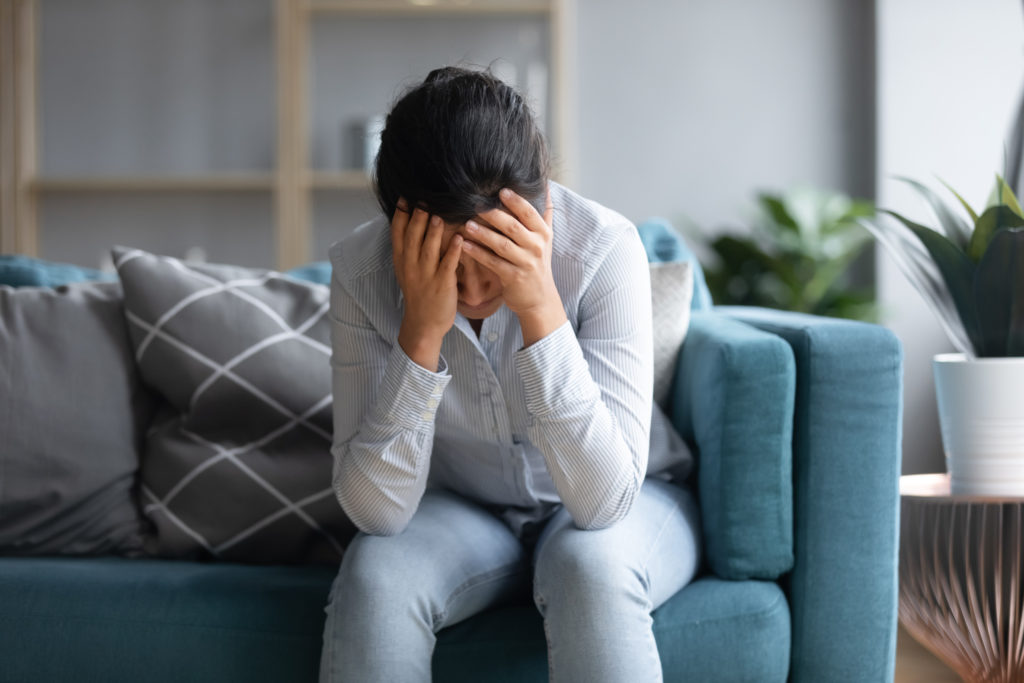December 22, 2022
Do you think you may be starting menopause? For many women, this is a tricky question to answer. The average age of menopause is 51 years old. However, symptoms of menopause may start many years before you fully stop getting your menstrual period. These symptoms are typically caused by fluctuating levels of the hormone estrogen. This can begin in your 30s and 40s, during a time called perimenopause.
Here’s what you need to know about what the 34 symptoms of menopause are, and how to cope.
34 symptoms of menopause
Each woman’s body may react slightly differently to changing levels of estrogen. If you’re wondering what the 34 symptoms of perimenopause are, make sure to check out this list below.
1. Night sweats
If you are waking up feeling sweaty or with a soaked pillowcase, you may be experiencing night sweats. These episodes may be caused by the changes in the central thermostat in your brain, your hypothalamus.
2. Hot flashes
 A sudden episode of feeling sweaty, flushed, or hot is called a hot flash. This is one of the most common symptoms of menopause.
A sudden episode of feeling sweaty, flushed, or hot is called a hot flash. This is one of the most common symptoms of menopause.
3. Changes in mood
When your estrogen levels are changing, they can affect your mood. You may feel “up” one moment, with tons of energy, and then blue or “down” the next. These changes are a normal and expected part of menopause
4. Changing menstrual periods
As your hormone levels change, you should expect to see changes in your menstrual period. This may include a longer or shorter cycle or bleeding. Eventually, your periods will slow to the point at which you have not had a period in 12 months, which is the technical definition of menopause.
5. Decreased sex drive
The hormones that control your menstruation also control your sex drive. During menopause, it is normal to experience a decreased libido. This means you may find it more challenging to become sexually aroused.
6. Vaginal dryness
When your estrogen levels decrease, it can make it harder for your vagina to produce natural lubrication. This can lead to vaginal dryness.
7. Breast tenderness
Many women will experience soreness in their nipples or breasts during perimenopause. Like many symptoms of menopause, this will go away in time.
8. Headaches
An increase in headaches during menopause can be triggered by changing hormones. This may be especially true if you have a history of migraines.
9. Changes in taste
Sometimes menopause can change the way you taste food. This can be due to fluctuating hormone levels, which can affect the environment of your mouth.
10. Burning mouth sensation
If you feel that your taste buds have become more sensitive—or that your mouth is burning, tingling, or tender—this could be caused by changing hormone levels.
11. Paresthesias
If you are having a tingling sensation in your hands or feet, known as paresthesia, this may be caused by menopause. However, it’s important to see a medical provider to rule out other causes.
12. Feeling tired
One of the most discouraging symptoms of menopause is feeling very fatigued. Often, women feel overtired because their sleep is disrupted by other menopause symptoms.
13. Joint pain
When your estrogen levels decrease, it can affect your joints. This can cause inflammation and arthritis in joints such as your hips and knees.
14. Bloating
Menopause can affect your gastrointestinal system. This is because your hormones can affect how much water you retain and even how quickly you digest food.
15. Other digestive changes
During menopause, the bacteria that live in your gut may also be affected by hormone changes. This can cause increased gassiness or reactions to foods that didn’t bother you in the past.
16. Electric shock sensations
It may be alarming, but some women may feel an “electric shock” sensation during menopause. This may be due to shifts in fluid or hormone levels, both of which can affect the nervous system.
17. Body aches and muscle tension
Menopause can cause changes in your musculoskeletal system. This can lead to feelings of increased tension or aching.
18. Trouble sleeping
There are several reasons why fluctuating estrogen levels may affect your sleep. You may find it harder to fall asleep or stay asleep during perimenopause.
19. Itchiness
The hormone estrogen plays a big role in regulating your hydration status. This includes your skin. When your skin dries out, it can become itchier.
20. Memory problems
When you’re going through menopause, your memory may also change. This may be because of hormonal changes or simply because you’re not sleeping as well.
21. Problems concentrating
For the same reason that your memory can change during menopause, you may also have problems concentrating.
22. Brittle nails
Menopause can change the way your body makes certain proteins, including keratin. Keratin is important to the growth and strength of your nails. This means during menopause you may experience cracked, brittle or weak nails.
23. Hair thinning
Hair loss occurs during menopause because of changing hormone levels. This is normal, but it can feel distressing.
24. Stress incontinence
Menopause may affect the way you pee. You may find yourself with increased urgency or urinary frequency. This is common during menopause, but it can be overcome with physical therapy.
25. Gaining weight
Hormones control your metabolism and appetite. You may take both factors for granted. But, as you’re going through menopause, you may notice that you feel hungrier or that you can’t shed weight as easily.
26. Allergies
Women going through menopause may be more likely to have allergies. This is because hormones can affect the type of antibody that’s linked to allergies, IgE.
27. Feeling dizzy or faint
When your hormones are fluctuating, your hormone insulin can also be affected. Insulin controls your blood sugar. Therefore, some women may feel dizzy or faint during perimenopause.
28. Irregular heartbeat
The feeling of racing, pounding, or irregular heartbeat may be a symptom of menopause. However, it is very important to see a healthcare provider if you are having an irregular heartbeat. They can help rule out other causes of this symptom.
29. More fragile bones
During and after menopause, women have a decrease in their bone density. This can lead them to have broken bones more frequently.
30. Irritability
It is understandable if you’re feeling more irritable during menopause. It can be difficult to manage the variety of symptoms that come along with this life transition.
31. Body odor
If you feel like you smell different, it may be due to fluctuating hormone levels, or increased sweating.
 32. Anxiety
32. Anxiety
You may feel more anxious during menopause. This can be caused by fluctuating hormone levels. But it’s important to see a healthcare provider to rule out other causes.
33. Panic disorder
Like how menopause can cause anxiety in some women, it can also trigger a panic disorder.
34. Depression
The hormonal changes of menopause may cause a low mood. However, if your mood is persistently low, you may be experiencing depression. Make sure to check in with a healthcare provider about this symptom.
Things women can do to alleviate menopause pain
It can feel overwhelming to read about the 34 symptoms of menopause. But you should keep in mind that it would be highly unusual to experience all these symptoms. Many women will have a few of these symptoms of menopause, but not all of them. Luckily, if you have symptoms of menopause, there are things you can do to help. For example, using a vaginal moisturizer or lubricant can help with symptoms of vaginal dryness. It may even boost your libido. For other menopause symptoms, specific supplements or prescription medications may help. Make sure to talk to your doctor before starting any new medicine or supplement to help with a symptom of menopause.
When to see a doctor
Menopause affects every woman differently. Some women may feel comfortable managing symptoms of menopause on their own. But, if you’re having a new symptom and you’re unsure whether it’s related to menopause or another health condition, make sure to check in with your doctor.
At the Healthcare Associates of Texas, our providers are experts in helping women navigate life stages, including menopause. For a women’s health evaluation or help with the 34 symptoms of menopause, contact us to schedule an appointment today.
DISCLAIMER
The information featured in this site is general in nature. The site provides health information designed to complement your personal health management. It does not provide medical advice or health services and is not meant to replace professional advice or imply coverage of specific clinical services or products. The inclusion of links to other web sites does not imply any endorsement of the material on such websites.